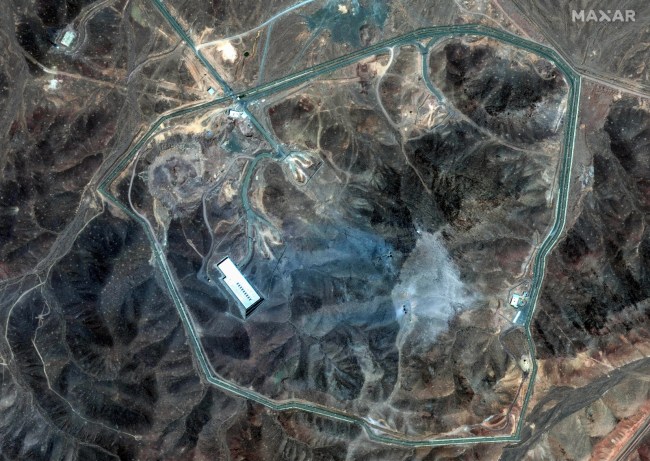Opinion Israel, Iran and the right to have nuclear weapons
While Iran faces scrutiny over its potential to develop nuclear weapons, Israel — estimated to possess between 80 and 90 nuclear warheads with the capacity to produce more — attracts little international attention and remains largely shielded from accountability
 How does Israel continue to be regarded as a responsible democracy when its actions repeatedly defy key international legal norms? How is its nuclear arsenal still considered safe despite its persistent refusal to acknowledge the weapons’ existence?
How does Israel continue to be regarded as a responsible democracy when its actions repeatedly defy key international legal norms? How is its nuclear arsenal still considered safe despite its persistent refusal to acknowledge the weapons’ existence? When the US warplanes struck three of Iran’s main nuclear sites — Natanz, Isfahan, and Fordow — President Trump claimed that “Iran’s key nuclear enrichment facilities have been completely and totally obliterated.” A Pentagon report, however, suggests that the strikes likely only set back Iran’s nuclear program by a few months. Nevertheless, the events of the past few days invoke a long-standing and deeply unsettling question: Why are some nations trusted with nuclear weapons while others are condemned merely for aspiring to acquire them?
Israel has defended its military actions as a necessary pre-emptive response to an existential threat, alleging that Iran is dangerously close to acquiring nuclear capability. For over 30 years, Netanyahu has repeatedly warned that Iran is on the brink of making nuclear weapons, despite assessments by the US and the International Atomic Energy Agency confirming that Tehran halted its weapons programme in 2003.
Even the US Director of National Intelligence, Tulsi Gabbard, testified in March that Iran is not pursuing nuclear weapons and has not revived the programme suspended in 2003. Her assessment echoes the 2003 fatwa by Supreme Leader Ayatollah Khamenei, which declared nuclear arms forbidden under Islamic law. Nonetheless, President Trump has publicly dismissed the conclusions of his own intelligence agency, declaring bluntly, “Iran can’t have a nuclear weapon. We’re not going to allow that.” Similarly, French President Emmanuel Macron has described Iran’s nuclear programme as “a threat to global security”, reflecting persistent Western scepticism, often at odds with intelligence findings.
The hypocrisy is astounding. While Iran faces scrutiny over its potential to develop nuclear weapons, Israel — estimated to possess between 80 and 90 nuclear warheads with the capacity to produce more — attracts little international attention and remains largely shielded from accountability. Although Tel Aviv is not a party to the Nuclear Non-Proliferation Treaty (NPT), it faces no significant pressure to disclose or dismantle its nuclear arsenal. In contrast, Iran, as an NPT signatory, remains subject to international sanctions, regular inspections, and diplomatic pressure.
This glaring double standard has not gone unnoticed. Noam Chomsky pointedly asked: “Israel’s nuclear arsenal is not regarded as a threat to peace, while Iran’s nuclear programme — even without evidence of weaponisation — is treated as an existential danger. Why?” His question lays bare the geopolitical biases that shape nuclear discourse. It depends on who holds power and whom the West chooses to trust.
Israel is frequently portrayed as a responsible and stable democracy, a stabilising force in a volatile regional environment. In contrast, Iran is commonly depicted as a revisionist state that supports non-state actors and challenges the existing international order. This perception has long shaped Western discourse and continues to fuel heightened scrutiny of Tehran’s nuclear ambitions. This framing was starkly articulated in President George W Bush’s 2002 “axis of evil” speech, in which he accused Iran of pursuing weapons of mass destruction and exporting terror — language that has continued to influence the selective application of non-proliferation norms and the broader securitisation of Iran’s nuclear programme.
This dichotomy — framing certain states as responsible and others as irresponsible — plays a significant role in the differential treatment of states and their nuclear capabilities. But such a framing is inherently subjective and shaped by geopolitical alignments and strategic interests, rather than being grounded in internationally accepted legal standards and ethical norms.
Moreover, this narrative also overlooks Israel’s own actions in the region. Israel has carried out repeated military interventions in Lebanon, Syria, and Gaza, and its prolonged occupation of Palestinian territories has been declared illegal by the International Court of Justice (ICJ). The International Criminal Court (ICC) has also issued arrest warrants for Israeli Prime Minister Benjamin Netanyahu and former Defence Minister Yoav Gallant for alleged war crimes.
How does Israel continue to be regarded as a responsible democracy when its actions repeatedly defy key international legal norms? How is its nuclear arsenal still considered safe despite its persistent refusal to acknowledge its very existence? What about its non-signatory status to the NPT, and its continued denial of access to IAEA inspectors, including at the Dimona reactor, long believed to be central to its nuclear weapons programme
It seems the distinction lies not in the destructive capability of nuclear weapons, but in the identity of those who possess them. As political scientist Scott Sagan observes, “It is not the bomb that is judged dangerous, but who holds it.”
This differential treatment not only corrodes trust in the global nuclear order but also deepens resentment across the region, reinforcing Iran’s strategic calculus to pursue nuclear deterrence. Unwavering Western backing for Israel’s military dominance emboldens its assertiveness and law-defying conduct.
If the global community is serious about peace and stability in West Asia, it must abandon this selective approach. As former IAEA chief Mohamed El Baradei warned: “There is no moral authority without consistency.” The time has come to uphold a nuclear order based on fairness, not the West’s favouritism.
The writer teaches international law at Aligarh Muslim University and heads its Strategic and Security Studies Programme





